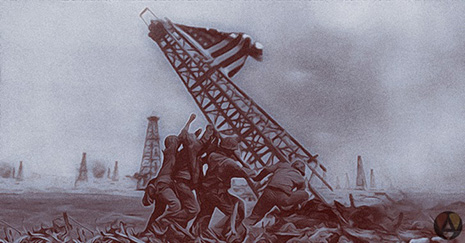The study, “‘Oil Above Water’: Economic Interdependence and Third Party Intervention ” was published in the Journal of Conflict Resolution and studied 69 instances of civil war since World War II where a third party government intervened. It found “ clear evidence that countries with a potential for oil production are more likely to be targeted by foreign intervention,” and that “the likelihood of intervention increases by a factor of about 100 from the low likelihood to a high likelihood scenario.”
That’s right: foreign intervention is 100 times more likely if the civil warring countries have oil.
As the researchers surmised:
“Since military intervention is a an expensive and risky endeavor, states must balance the expected costs of intervention against their strategic interests and possible benefits… Our model shows how potential interveners with substantial oil imports thus have incentives to contain hostilities, using intervention as a means of inhibiting or reducing the risk of conflict spillovers and economic turmoils. “
The study notes, for example, that after oil was discovered in Chad in the late 1970s and 80s, France (the nation’s former colonizer) repeatedly intervened on behalf of the government in power. The war had been preventing further exploration of the oil reserves. Around the same time, France had no interest in intervening in the Tuareg rebeillion in Mali… until, that is, the potential for oil was discovered in the mid 2000s. By 2012, France had intervened, sounding a familiar war cry: they were combating Islamic extremism.
Similarly, the United States took action in the civil war in Angola in the 1970s after Angola discovered oil. It also intervened in the conflicts of Guatemala, Indonesia and the Philippines. All three nations had large oil reserves. As detailed in the study, similar patterns apply in the United Kingdom and Russia.
By contrast, countries with large reserves of oil, namely in the Middle East, rarely intervene in foreign civil wars. One exception was Saudi Arabia’s involvement in Yemen in 1962, before oil was discovered there. Oil rich countries such as Qatar, Bahrain, and the United Arab Emirates have no history of intervention.
The researchers stressed that the findings were specific to foreign intervention in civil wars, noting that in both U.S. invasions of Iraq (in the 1990s and in 2003), oil exports dropped following the invasions. However, they noted:
“we see little evidence to suggest that the US aggression against Iraq fundamentally undermines the logic of our arguments about how oil structure incentives for intervention in civil wars.”
They asserted more documentation is needed, but regardless, the study exposes the Western thirst for oil. History shows the lengths to which a government will go to secure it (such as the CIA’s coup in Iran in 1953 after the democratically elected leader chose to nationalize oil fields). The Dutch, who supported the Iraq war and sent troops in 2003, also benefited from intervention: Shell Oil, a Dutch company, just signed an $11 billion deal with the Iraqi government to build a petrochemicals plant in Basra. Further, the current Western intervention in the Syrian civil war is also tied to oil.
Other drives for war include the general need to sustain the military-industrial complex by dropping bombs and thereby justifying the need to buy more. The CIA also has shady dealings in the opium trade in Afghanistan. Still, oil appears to be the most common (or at least most blatant) motivator for war in contemporary times.
The results of the new study come as no surprise to those who see through the deception of blood and oil-thirsty oligarchs. These findings will, however, be integral to exposing the true motivations for excessive violence and needless destruction.
More about:
















































